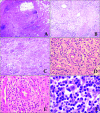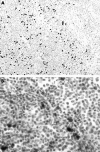Anaplastic lymphoma kinase (ALK) protein expressing lymphoma after liver transplantation: case report and literature review
- PMID: 12401829
- PMCID: PMC1769798
- DOI: 10.1136/jcp.55.11.868
Anaplastic lymphoma kinase (ALK) protein expressing lymphoma after liver transplantation: case report and literature review
Abstract
Most post transplantation lymphoproliferative disorders (PTLDs) are Epstein-Barr virus (EBV) associated B cell proliferations. We report a case of aggressive anaplastic large cell lymphoma expressing the anaplastic lymphoma kinase (ALK) protein in a 58 year old man who had previously undergone liver transplantation. A definite diagnosis was not possible on histopathological examination. Immunostaining clearly showed a predominant population of small irregular lymphocytes, admixed with large cells strongly positive for CD30, epithelial membrane antigen, and the ALK protein. Neoplastic cells were of the T/cytotoxic phenotype. In situ hybridisation with EBV encoded early RNA probes showed only a few scattered positive non-neoplastic small lymphocytes. Polymerase chain reaction analysis of immunoglobulin and T cell receptor rearrangements was negative. The NPM-ALK fusion transcript associated with the t(2;5) translocation was detected by reverse transcription polymerase chain reaction. A review of the literature revealed 76 cases of T cell PTLD, showing a broad spectrum of morphological features and clinical behaviour. Most of these cases were EBV negative (61 of 76) and occurred after renal transplantation (48 of 76). To our knowledge, this is the first case of ALK positive lymphoma occurring in the setting of organ transplantation. This observation stresses the need for accurate immunostaining for diagnosing this rare, apparently aggressive, lymphoma in immunosuppressed patients.
Figures


Similar articles
-
ALK expression defines a distinct group of T/null lymphomas ("ALK lymphomas") with a wide morphological spectrum.Am J Pathol. 1998 Sep;153(3):875-86. doi: 10.1016/S0002-9440(10)65629-5. Am J Pathol. 1998. PMID: 9736036 Free PMC article.
-
Absence of anaplastic lymphoma kinase (ALK) and Epstein-Barr virus gene products in primary cutaneous anaplastic large cell lymphoma and lymphomatoid papulosis.Br J Dermatol. 1997 Nov;137(5):680-6. Br J Dermatol. 1997. PMID: 9415224
-
Variant translocation partners of the anaplastic lymphoma kinase (ALK) gene in two cases of anaplastic large cell lymphoma, identified by inverse cDNA polymerase chain reaction.J Clin Exp Hematop. 2014;54(3):225-35. doi: 10.3960/jslrt.54.225. J Clin Exp Hematop. 2014. PMID: 25501114
-
The t(2;5) in human lymphomas.Leuk Lymphoma. 1998 Apr;29(3-4):249-56. doi: 10.3109/10428199809068562. Leuk Lymphoma. 1998. PMID: 9684923 Review.
-
Primary rare anaplastic large cell lymphoma, ALK positive in small intestine: case report and review of the literature.Diagn Pathol. 2016 Sep 9;11(1):83. doi: 10.1186/s13000-016-0539-6. Diagn Pathol. 2016. PMID: 27612448 Free PMC article. Review.
Cited by
-
Pathobiology of anaplastic large cell lymphoma.Adv Hematol. 2010;2010:345053. doi: 10.1155/2010/345053. Epub 2011 Feb 6. Adv Hematol. 2010. PMID: 21331150 Free PMC article.
-
Metachronous EBV-associated B-cell and T-cell posttransplant lymphoproliferative disorders in a heart transplant recipient.Am J Surg Pathol. 2009 Jan;33(1):149-54. doi: 10.1097/PAS.0b013e318181a826. Am J Surg Pathol. 2009. PMID: 18941401 Free PMC article.
-
Three different histological subtypes of Epstein-Barr virus-negative post-transplant lymphoproliferative disorder in a patient with hepatitis C infection.Int J Hematol. 2014 Sep;100(3):307-11. doi: 10.1007/s12185-014-1599-6. Epub 2014 May 31. Int J Hematol. 2014. PMID: 24879033
-
Primary cardiac post-transplantation lymphoproliferative disorder--T cell type: a case report and review of the literature.J Clin Pathol. 2007 Apr;60(4):447-8. doi: 10.1136/jcp.2006.041749. J Clin Pathol. 2007. PMID: 17405986 Free PMC article. Review. No abstract available.
References
-
- Knowles D, Cesarman E, Chadburn A, et al. Correlative morphologic and molecular genetic analysis demonstrates three distinct categories of postransplantation lymphoproliferative disorders. Blood 1995;85:552–65. - PubMed
-
- Hanson MN, Morrison VA, Peterson BA, et al. Posttransplant T-cell lymphoproliferative disorders—an aggressive, late complication of solid organ transplantation. Blood 1996;88:3626–33. - PubMed
-
- Hoshida Y, Li T, Dong Z, et al. Lymphoproliferative disorders in renal transplant patients in Japan. Int J Cancer 2001;91:869–75. - PubMed
-
- Van Gorp J, Doornewaard H, Verdonck L, et al. Post-transplant T-cell lymphoma: report of three cases and a review of the literature. Cancer 1994;73:3064–72. - PubMed
Publication types
MeSH terms
Substances
LinkOut - more resources
Full Text Sources
Medical
